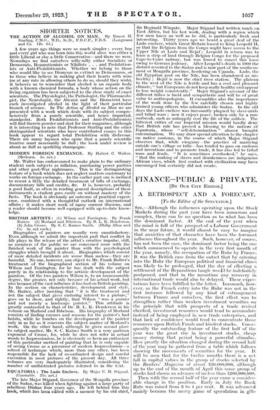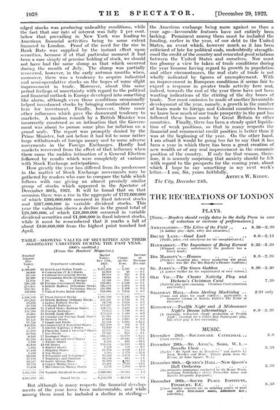FINANCE-PUBLIC & PRIVATE.
[By OUR CITY EDITOR.]
A RETROSPECT AND A FORECAST.
[To the Editor of the SPECTATOR.] Sin,—Although the influences operating upon the Stock Markets during the past year have been numerous and complex, there can be no question as to . what has been the dominant factor. At the end of the year when the mind is full of the prospect of a Labour Government in the near future, it would almost be easy to imagine that anxieties of that character have been the foremost influence throughout the year. Such, however, of course, has not been the case, the dominant factor being the one which commenced to operate in the very first month. of the year, namely, the occupation of the Ruhr by France. It was the British case from the outset that by entering into the Ruhr the European political and financial chaos was likely to be prolonged, that the day of effecting a settlement of the Reparations tangle would be indefinitely postponed, and that in the meantime any recovery in international trade would also be delayed. These expec- tations have been fulfilled to the letter. Inasmuch, how- ever, as the French entry into the Ruhr was not in the first instance followed by any kind of estrangement between France and ourselves, the first effect was to strengthen rather than weaken investment securities on the principle that with prospects of a trade revival checked, investment resources would tend to accumulate instead of being employed in new trade enterprises, and that lack of confidence would tend to concentrate those resources upon British Funds and kindred stocks. Conse- quently the outstanding feature of the first half of the year was the great rise in investment stocks, cheap money during that period being a powerful stimulus. How greatly the situation changed during the second half of the year may be gathered from a table which follows showing the movements of securities for the year. It will be seen that for the twelve months there is a net fall in capital values in the group of stocks selected by the Bankers' Magazine of about £30,000,000, although up to the end of the month of April this same group of stocks had shown an advance of no less than t260,000,000.
Then with the second half of the year came a consider- able change in the position. Early in July the Bank Rate was raised from 3 to 4 per cent. It was advanced mainly because the merry game of speculation in gilt- edged stocks was producing unhealthy conditions, while the fact that our rate. of interest was fully 2 per cent. below that prevailing in New York was leading to American financial activities being to some extent financed in London. Proof of the need for the rise in Bank 'Rate was supplied by the instant effect -upon securities, because if at that particular moment it had been a case simply of genuine holding of stock, we should not have had the same slump as that which occurred during the month of July. The slump was partially
recovered, however, in the early autumn months when, moreover, there was a tendency to acquire industrial and semi-speculative stocks on the hopes of some slight improvement in trade. Moreover, about this same period feelings of uncertainty with regard to the political and financial outlook in Europe developed into something like alarm, although even those conditions occasionally helped investment stocks by bringing continental money here for investment. Finally, however, there came other influences which gave the downward tendency to markets. A random remark by a British Minister was incorrectly construed as an intimation that the Govern- ment was about to pursue some plan for inflation on a grand scale. The report was promptly denied by the Prime Minister, but not before it had led to some rather large withdrawals of foreign money and to some adverse movements in the Foreign Exchanges. Hardly had markets recovered from the effect of that influence when there came the sudden intimation of a General Election followed by results which were completely at variance with Stock Exchange anticipations. How greatly the year has differed from its predecessor
in the. matter of Stock Exchange movements may be gathered by readers who care to compare the table which follows with one giving an almost precisely similar group of stocks which appeared in the Spectator of December 30th, 1922. It will be found that on that occasion there was a rise in the aggregate of t712,000;000 of which £395,000,000 occurred in fixed interest stocks and £317,000,000 in variable dividend stocks. This year the valuation shows a decline in the grand total of £29,500,000, of which £28,300,000 occurred in variable dividend securities and £1,200,000 in fixed interest stocks, while it must be remembered that it marks a fall of about £340,000,000 from the highest point touched last
April.
TABLE-SHOWING VALUES OF SECURITIES AND THEIR AGGREGATE VARIATION DURING THE PAST YEAR. (000's omitted.) (From the Bankers' Magazine.) Nominal Market Amount Values. (Par Dec. 17th, Value). Department containing 1923.
£ £
3,566,600 10 British and Indian Funds .. .. 3.215,024
58,950 9 Corporation (U.K.) Stocks .. 42,959
83,550 8 Colonial Governmeht Stocks .. 68,188 22,300 8 Corporation Stocks (Colonial) .. 19,898 21,050 7 Do. do. (Foreign) .. 12,506
598,230 16 Foreign Government Stocks .. 220,665
254,655 6 British Railway Debenture Stocks 196,478 310,765 6 Do. Preference Stocks 201,096 132,000 7 United States Bonds (Gold) .. 128,895 , .
5,040,100 87 Fixed Interest Stocks .. .. 4,165,709 815,325 13 British Railway Ordinary Stocks.. 241.547
18,900 5 Indian Railway Stocks .. .. 19.736 88,350 5 Colonial Railways .. .. .. 113,187 474,000 11 United States Railway Shares .. 420,315 141,200 20 Foreign Railways .. .. .. 84,052
59,885 18 Britbh Bank Shares .. .. 173,213 43,000 18 Colonial and Foreign Bunk Shares 81,599
18,121 10 Brewery Stocks .. .. .. 45,084 17,750 . 7 Canals and Docks .. .. .. 15,519 146,916 38 Commercial tt Industrial Shares .. 337.280
9,537 3 Electric Lighting & *Power ' ... 13,630
15,100 9 Financial. Land 1 investm't Shares 22.035 30,080 7 Gas Stocks .. .. .. • . 28.341 9,343 17 Insurance Shares .. .. • • 108.253 58,294 14 Iron, Coal and Steel Shares .. 59.517 .. 3,100 5 Nitrate Shares 4.165 42,649 10 011 Shares .. .. 110,144 5,402 9 Rubber Shares .. .. 7.519
17,456 5 Shipping Shares .. .. 24.374
1,890 6 Tea Shares .. .. . . .. 5,585
20,808 9 Telegraphs and Telephones .. 34.502
27,716 7 Tramways and Omnibus .. . • 12,544 29,517 19 South African Mines .. • • 81.088
28,735 6 Copper Mining Shares .. • • 35.301 11,859 7 Miscellaneous Mining Shares • • 5,731
1,635,333 278 Variable Dividend Securities .. 2,090,861 6,683,433 365 Grand totals .. .. 6,256,570 -29,509
But although in many respects the financial develop- ments a the _year_ have been unfavourable, and while among them must be included a decline in sterling-
Change on the Year.
- 6,787
- 46 + 325 + 375
- Old
- 2,546 - 1,304 + 2,406 + 7,055 - 1,165 + 2,734 + 1,028 + 8,173 + 3.485 5,799 + 1,546 - 3,400 + 5:095 + 1,690 + 506 + 2.406 + 655 - 928 + 12,070 - 10,622 + 402 -32.342 - 550 - 4,039 + 1.379 - 2,876 - 685 - tf)42 - 5,430 - 1,900 - 28,344 Increase or Decrease Per cent.
- 0-2 - 0-1 + 0.4 + 11) - 4.9 + 0-6 + 0.9 + 5.7 -= 0.0 + 1.1 + 5-5 + 7.7 + - 6.4 + 0-9 - 4.0 + 1.3 +12-2 + 0.1 + 2-1 + 3-0 - 3.1 +12-5 -15.1 +10-5 - 22-6 - 6-7 -14.2 +32-8 - 7.6 - 5.1 - 1-2 - 13.1 -25.0 - 1.3 - 0.4
the American exchange being more against us than a year ago-favourable features have not entirely been lacking. Prominent among them must be included the funding, earlier in the year, of our debt to the United States, an event which, however much as it has been criticised of late for political ends, undoubtedly strength- ened the credit of the country and cemented good relations between the United States and ourselves. Nor must too gloomy a view be taken of trade conditions during the year because having regard.to growth in population and other circumstances, the real state of trade is not wholly indicated by figures of unemployment. With an improvement in European conditions it seems fair to expect a response in greater trade activity here and, indeed, towards the end of the year there have not been wanting indications of the stirring of the dry bones of trade. Nor must omission be made of another favourable development of the year, namely, a growth in the number of loans made to foreign and Colonial countries because we know how much of our trade prosperity in the past has followed these loans made by Great Britain to other countries. Finally, there has been a steady quiet liquida- tion of weak positions, so that in many respects the financial and commercial credit position is better than it was at the beginning of the year. On the other hand, I am afraid it would be going too far to say that it has been a year in which there has been a great creation of new wealth or of any real improvement in the economic position of the country. If only for that reason, there- fore, it is scarcely surprising that anxiety should be felt with regard to the prospects for the coming year, about which I hope to say something in my next week's letter.-I am, Sir, yours faithfully,



































 Previous page
Previous page